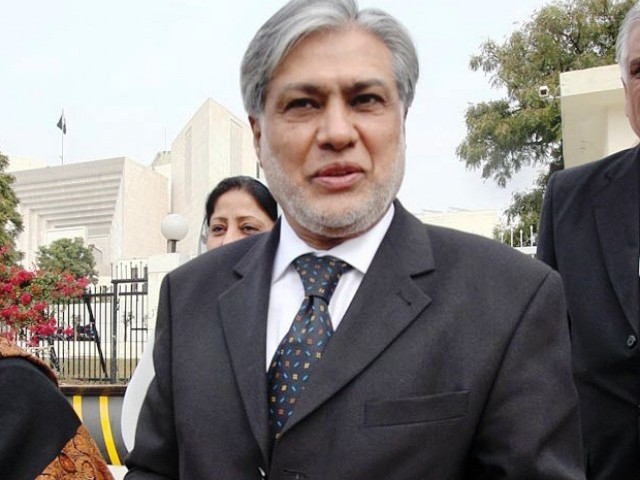- Pakistan had recently been moved up four places in the World Bank’s ‘Ease of Doing Business’ rankings
- BISP allocation is tripled from Rs 43 billion in FY 2013 to Rs 115 billion in FY 2017
Federal Finance Minister Senator Ishaq Dar said on Sunday that Pakistan had successfully tapped international capital market four times since 2014 and each time received an overwhelming response.
He was addressing the closing ceremony of “Colours of Indus 2017 Programme” at the Governor House.
Punjab Governor Rafique Rajwana, and Ali Jamil from Young Presidents’ Organisation (YPO) also addressed the ceremony.
The federal minister termed the event an excellent way of showcasing rich cultural diversity and abundant opportunities, a growing and developing Pakistan offered to young entrepreneurs.
Business leaders and entrepreneurs should take advantage of attractive business opportunities and investment climate in Pakistan, he added.
Ishaq Dar mentioned that when the PML-N government came to power in 2013, the country was facing challenges of unstable macro-economic situation with GDP growth at only 3 per cent, foreign reserves of below $8 billion, spiralling circular debt, crippling energy shortages and fiscal deficit of 8.8 percent.
However, the government under the leadership of Prime Minister Nawaz Sharif set priorities right by focusing on 4Es: Energy, Economy, Elimination of extremism, and Education.
He said that the country was now on the road to macro-economic stability to achieve higher, sustainable and inclusive growth.
Dar said that for the first time, Pakistan successfully completed all 12 reform steps of EFF (Extended Fund Facility) Programme of the International Monetary Fund (IMF), asserting that growth momentum continued to remain above 4 per cent for the third year in a row, and the GDP growth was registered 4.71 per cent in FY 2016, highest in eight years.
Target for the GDP growth in FY 2017 is around 5.5 per cent and 7 per cent during FY 2018-19, he added.
International organisations, he mentioned, had also recognised Pakistan’s economic turnaround, citing that the IMF had raised its GDP growth forecast for Pakistan for FY 2017 from 4.7 to 5 per cent and projected GDP growth of 5.5 per cent; Asian Development Bank (ADB) raised its GDP forecast for 2017 from 4.8 to 5.2 percent, and the World Bank projected 5.2 per cent GDP growth in FY 2017 and 5.4 per cent in FY 2018.
The economist also recently ranked Pakistan as the 5th fastest growing global economy as well as the fastest growing Muslim economy, he said.
The federal finance minister asserted that inflation was brought down to less than 3 per cent in FY 2016, the lowest in decades, and fiscal deficit reduced from 8.2 to 4.6 per cent in FY 2016, while on the revenue side, tax collection increased by 60 per cent over last three years and Forex reserves were sufficient for over five months of import cover.
Underprivileged segments of society had been main beneficiaries of recent economic progress, he said and cited that the BISP allocation had been nearly tripled from Rs 43 billion in FY 2013 to Rs 115 billion in FY 2017, and Pakistan had made significant progress in poverty reduction.
Federal PSDP (Public Sector Development Programme) had increased from Rs 348 billion in FY 2013 to Rs 800 billion in FY 2017, he added.
Dar said that recent PwC Report projected Pakistan’s economy to be the 20th largest by 2030 and the 16th largest economy by 2050, above Italy and Canada in the list.
Under Investment Policy 2013, he said, equal treatment was ensured to local and foreign investors, foreign equity up to 100 per cent was allowed and there was no requirement of minimum foreign investment amount due to which various reputable international investors and companies had started investing here.
The minister said the government was implementing a new ‘Ease of Doing Business Reform Strategy’ with time-bound measures to strengthen the business climate and foster private investments.
Pakistan had recently been moved up four places in the World Bank’s ‘Ease of Doing Business’ rankings and was also one of the top ten global improvers, he added.
32 years old Companies Ordinance 1984 had been revamped and a new Companies Bill 2016 was under consideration by the parliament, he mentioned. He added that Pakistan had also become signatory to the OECD Anti-Tax Evasion Convention, and the OECD Anti-Bribery Convention was another forum being reviewed by the Pakistan government for joining.
He said that under National Power Policy 2013, the government had actively been working on projects to add 27,000MW to power generation capacity, including 10,000MW to be added to the system by March 2018. He said that electricity load-shedding had been reduced from 15 hours to 4 hours in rural areas and from 12 hours to 3 hours in urban areas.
He said that a campaign against extremism through Operation Zarb-e-Azb and Karachi clean-up operation had led to improved security situation.




